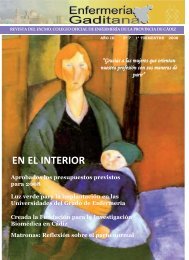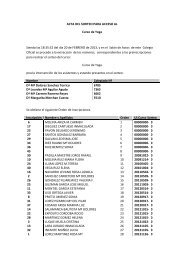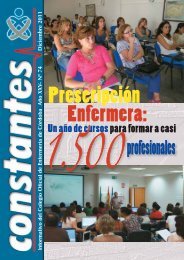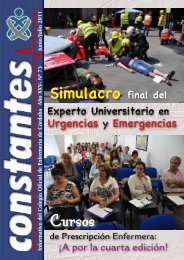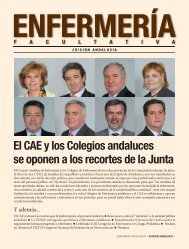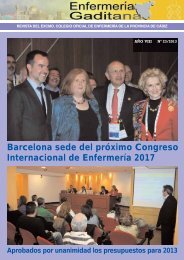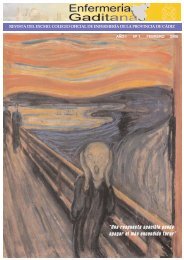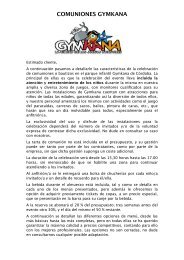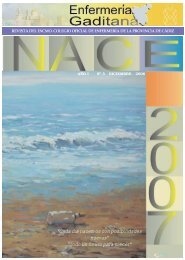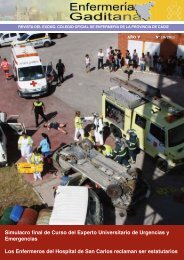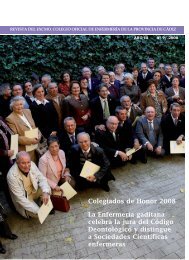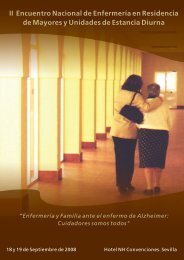La Junta General de Colegiados aprueba que se reduzca el importe ...
La Junta General de Colegiados aprueba que se reduzca el importe ...
La Junta General de Colegiados aprueba que se reduzca el importe ...
Create successful ePaper yourself
Turn your PDF publications into a flip-book with our unique Google optimized e-Paper software.
21<br />
al día”, <strong>se</strong> refieren a las ayudas <strong>de</strong> la Ley <strong>de</strong><br />
Depen<strong>de</strong>ncia. Aun<strong>que</strong> es un hecho asumido<br />
socialmente <strong>que</strong> <strong>se</strong> espera <strong>que</strong> la familia cui<strong>de</strong><br />
a sus ancianos.<br />
Si bien cabría esperar a priori niv<strong>el</strong>es más altos<br />
<strong>de</strong> sobrecarga y estrés a la hora <strong>de</strong> afrontar<br />
<strong>el</strong> cuidado, como ocurre en otros estudios<br />
en <strong>el</strong> nuestro es bajo. Creemos <strong>que</strong> pue<strong>de</strong><br />
<strong>de</strong>ber<strong>se</strong> a<strong>de</strong>más <strong>de</strong> lo expuesto anteriormente<br />
al perfil <strong>de</strong> la persona cuidada, ya <strong>que</strong> hay<br />
diferencias con otros estudios respecto al niv<strong>el</strong><br />
<strong>de</strong> <strong>de</strong>pen<strong>de</strong>ncia. <strong>La</strong>s personas cuidadas<br />
estudiadas tenían un grado leve <strong>de</strong> <strong>de</strong>pen<strong>de</strong>ncia<br />
(enfermeda<strong>de</strong>s cardiovasculares, metabólicas,<br />
etc.), en cambio, en otros estudios<br />
hay un predominio <strong>de</strong> grados <strong>de</strong> <strong>de</strong>pen<strong>de</strong>ncia<br />
más <strong>el</strong>evados (12).<br />
Tampoco encontramos diferencias significativas<br />
al r<strong>el</strong>acionar los niv<strong>el</strong>es <strong>de</strong> estrés y sobrecarga<br />
con <strong>el</strong> apoyo social percibido en su<br />
entorno, algunos trabajos establecen <strong>que</strong> <strong>el</strong><br />
hecho <strong>de</strong> <strong>que</strong> los cuidadores reciban ayuda<br />
<strong>de</strong> alguien cercano hacen <strong>que</strong> tengan menos<br />
estrés y sobrecarga (13).<br />
Finalmente al indagar entre las variables co<strong>de</strong>pen<strong>de</strong>ncia<br />
y sobrecarga, tampoco encontramos<br />
importante r<strong>el</strong>ación entre <strong>el</strong>las, lo <strong>que</strong><br />
nos parece corrobora lo expuesto anteriormente<br />
<strong>de</strong>l grado <strong>de</strong> <strong>de</strong>pen<strong>de</strong>ncia <strong>de</strong> la persona<br />
cuidada.<br />
Hemos llegado a la conclusión <strong>de</strong> <strong>que</strong> hay<br />
poco niv<strong>el</strong> <strong>de</strong> estrés y sobrecarga, menor <strong>que</strong><br />
en otros estudios. <strong>La</strong> r<strong>el</strong>ación entre las distintas<br />
variables también es pe<strong>que</strong>ña.<br />
Los cuidadores <strong>de</strong>l estudio son mujeres, hijas,<br />
casadas y con estudios primarios incompletos.<br />
Sólo un 15% trabaja fuera <strong>de</strong>l<br />
hogar, algunas <strong>de</strong> <strong>el</strong>las han adaptado <strong>el</strong> trabajo,<br />
otros han tenido <strong>que</strong> <strong>de</strong>jar <strong>de</strong> trabajar,<br />
la gran mayoría no tienen un trabajo estable,<br />
viven en un medio rural y conviven y<br />
han convivido la mayoría <strong>de</strong> su vida cerca<br />
<strong>de</strong> sus mayores.<br />
Para los cuidadores <strong>de</strong> nuestro estudio, cuidar<br />
<strong>de</strong> sus mayores es algo socialmente esperado<br />
y aceptado.<br />
Bibliografía<br />
1) INSERSO. Cuidados en la vejez. El apoyo informal.<br />
Madrid: Ministerios <strong>de</strong> Asuntos Sociales<br />
INSERSO; 1995.<br />
2) Health Canada. National profile of family caregivers<br />
in Canada 2002. Final Report.<br />
3) García-Calvente MM, Mateo I, Gutiérrez P. Cuidados<br />
y cuidadores en <strong>el</strong> sistema informal <strong>de</strong><br />
salud. Granada: Escu<strong>el</strong>a Andaluza <strong>de</strong> Salud Pública<br />
e Instituto Andaluz <strong>de</strong> la Mujer; 1999.<br />
4) Hunt CK. Concepts in caregivers re<strong>se</strong>arch J.<br />
Nurs Scholarsh 2003 (Medline).<br />
5) Argimón JM, Limón E, Abós T. Sobrecarga y calidad<br />
<strong>de</strong> vida <strong>de</strong> los cuidadores informales <strong>de</strong><br />
pacientes discapacitados. Aten Primaria 2003.<br />
6) Zarit SH, Reever K, Bach-Peterson J. R<strong>el</strong>atives<br />
of the impaired <strong>el</strong><strong>de</strong>rly: Corr<strong>el</strong>ates of fe<strong>el</strong>ing of<br />
bur<strong>de</strong>n. Gerontologist 1980 (Medline).<br />
7) Pearlin LI. The careers of caregivers. Gerontologist<br />
1991.<br />
8) Noonan AE, Tennstedt SL. Meaning in caregiving<br />
and its contribution to caregiver w<strong>el</strong>lbeing.<br />
Gerontologist 1997 (Medline).<br />
9) Zarit SH, Cheri A, Bout<strong>se</strong>lis M.Interventions<br />
with caregivers of <strong>de</strong>mentia patients: comparison<br />
of two approaches. Psychol Aging 1987.<br />
(Medline)<br />
10) Espinosa, Clemencia, Serrano y Cols, 1996.<br />
11) Bravo M, Serrano G. <strong>La</strong> psicología preventiva y<br />
<strong>el</strong> apoyo social.<br />
Madrid: Ediciones Pirámi<strong>de</strong>, 1992.<br />
12) Santiago P, López O, Lorenzo A. Morbilidad en<br />
los cuidadores <strong>de</strong> pacientes confinados en su<br />
domicilio. Atención Primaria 1999.<br />
(Medline).<br />
13) Scharlach AE. Caregiving and employmed:<br />
Competing or Scharlach.<br />
AE. Caregivien and employmed: Competing or<br />
complementary roles. Gerontologist 1994.<br />
(Medline).<br />
14) Alustiza A. Entorno familiar con las personas<br />
con discapacidad.<br />
Algunos resultados pr<strong>el</strong>iminares para <strong>el</strong> País<br />
Vasco <strong>de</strong> la Encuesta sobre Discapacida<strong>de</strong>s,<br />
Deficiencias y Estado <strong>de</strong> Salud <strong>de</strong> 1999.<br />
Rev. esp. Gerontol.2005; 40: 345-50.<br />
15) <strong>La</strong>rrañaga. R<strong>el</strong>aciones intergeneracionales en<br />
la familia y re<strong>de</strong>s <strong>de</strong> apoyo. En: Arregi B, Dávila<br />
A, editores. Reproduciendo la vida,<br />
manteniendo la familia. Reflexiones sobre la<br />
fecundidad y <strong>el</strong> cuidado familiar <strong>de</strong>s<strong>de</strong> la experiencia<br />
<strong>de</strong> Euskadi. Bilbao: Servicio Editorial<br />
<strong>de</strong> la UPV/EHU; 2005.<br />
16) García-Calvente MM, Mateo-Rodríguez I, Eguiguren<br />
AP. El sistema informal <strong>de</strong> cuidados en<br />
clave <strong>de</strong> <strong>de</strong>sigualdad. Gac Sanit. 2004; 18<br />
Supl 1:132-9.<br />
17) García-Calvente MM, Mateo I, Gutiérrez, P. Cuidados<br />
y cuidadores en <strong>el</strong> sistema informal <strong>de</strong><br />
salud. Granada: Escu<strong>el</strong>a Andaluza <strong>de</strong> Salud<br />
Pública e Instituto Andaluz <strong>de</strong> la Mujer; 1999.<br />
18) Jiménez A, Huete A. <strong>La</strong> discapacidad en España:<br />
datos epi<strong>de</strong>miológicos. Madrid: Real Patronato<br />
sobre Discapacidad; 2002.<br />
19) Biurrun A, Artaso B, Goñi A. Apoyo social en<br />
cuidadores familiares <strong>de</strong> enfermos con <strong>de</strong>mencia.<br />
Geriatrika 2003; 19: 181-7.<br />
20) Montoso J. Con<strong>se</strong>cuencias psicosociales <strong>de</strong>l<br />
cuidado informal a personas mayores. Rev Int<br />
Sociol 1999; 23:7-29.<br />
21) Segura JM, Bastida N, Martí N, Riba M. Los enfermos<br />
crónicos domiciliarios y su repercusión<br />
en los cuidadores principales. Atención<br />
Primaria 1998; 21: 431-6 (Medline) (Artículo).<br />
22) Llácer A, Zunzunegui MV, Béland F. Conocimiento,<br />
uso y previsión <strong>de</strong> <strong>se</strong>rvicios sanitarios<br />
y sociales <strong>de</strong> apoyo al cuidador <strong>de</strong> personas<br />
mayores con incapacida<strong>de</strong>s. Rev Esp Geriatr<br />
Gerontol 1999.<br />
23) Martínez MA. <strong>La</strong>s familias ya no po<strong>de</strong>mos<br />
más. Riesgos <strong>de</strong> exclusión social <strong>de</strong> las familias<br />
<strong>que</strong> cuidan <strong>de</strong> enfermos crónicos graves.<br />
Revista <strong>de</strong>l Ministerio <strong>de</strong> Trabajo y Asuntos<br />
Sociales 2002; 35: 145-65.<br />
24) Roca M, Úbeda I, Fuent<strong>el</strong>saz C, López R, Pont<br />
A, García L et al. Impacto <strong>de</strong>l hecho <strong>de</strong> cuidar<br />
en la salud <strong>de</strong> los cuidadores familiares.<br />
Aten Primaria 2000; 26:53-67 (Artículo).<br />
25) Schofi<strong>el</strong>d H, Bloch S, Herman H, Murphy B,<br />
Nankervis J, Singh B.<br />
Family caregivers. Disability, illness and ageing<br />
St. Leonards:<br />
Allen&Unwin; 1998.<br />
26) Scharlach AE. Caregiving and employment:<br />
Competing or complementary roles? Gerontologist<br />
1994; 34:34-43.<br />
27) Moore MJ, Zhu CW, Clipp EC. Informal cost of<br />
<strong>de</strong>mentia care: estimates from National Longitudinal<br />
Caregiver Study. J Gerontol B Psychol<br />
Sci 2001;56: S219-28 (Medline).



